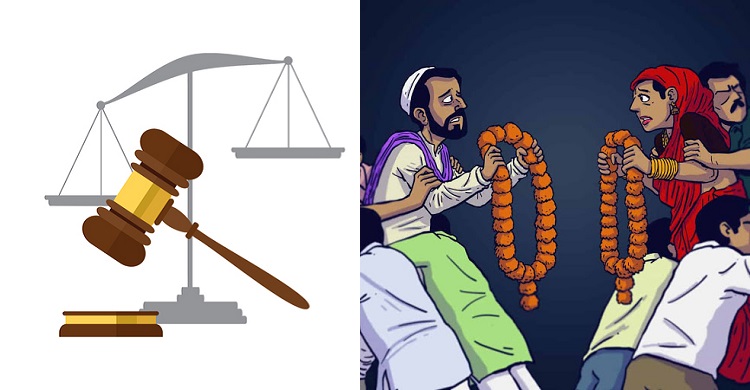Legal position of ‘Court Marriage’ in Bangladesh

Fahim uddin Raihan Niloy: The term ‘Court Marriage’ is a familiar one in our society. Couples often being rejected from their family take resort to court marriage. In short ‘Court Marriage’ neither amount to any marriage nor it has been recognized by any provision of law. It is just an affidavit of marriage between the couple before the first class magistrate.
An affidavit is an affirmation of subject-matter in writing in a non-judicial stamp before the first class magistrate. When a couple executes a marriage in an affidavit, they assert that they have been legally married to each other. It is just an assertion of the couple that they have made the decision on their own discretion and without any undue influence or coercion. Now the question arises that as they have made an assertion of their free consent in marriage, what is the document of marriage?
It should be noted that the affidavit of marriage is just a document of their free consent but not that of their marriage. The proof of marriage is rendered by registration of marriage and kabinnama. The Muslim marriage and divorce (registration) act 1974 provides that every marriage under Muslim law shall be registered under the provision of this act and for this purpose govt. will appoint marriage registrars as many as it deems to be fitted. To register the marriage, it is necessary for the requirements to be satisfied. To validate a marriage, the essentials are:
1) Offer from one part and acceptance from the other.
2) According to sharia law, two male or one male and two female witnesses. Whatever, The Marriage and divorce registration act 1974 equally treated both male and females.
3) Both the parties must be free in their consent. Consent under coercion renders the marriage void.
4) The parties of the marriage must have attained the age of majority under the “Child marriage restraint act 1929” which is 21 for boys and 18 for the girls. Marriage below this age causes punishable offense but not declare the marriage to be void.
So, when the requirement is satisfied, a couple before a govt. approved kazi, producing all the documents and witnesses, fill in the form of kabinnama and tender their sign in required box. The kazi, after scrutinizing the required, registers the marriage in the book.
Same rules are applicable to Hindu, Christian and Buddhist communities in Bangladesh. Though Hindu Marriage Registration Act 2012 provides for registration of Hindu marriage, no such provision has been accorded regarding Christian and Buddhist. Such communities shall register and obtain a marriage certificate from the priest or administration of church/temple under which the marriage is solemnized.
Kabinnama and marriage certificate is the superior legal documents of the marriage whereas an affidavit is a secondary confirmation of the free consent of the parties. Now the question may arise if the kabinnama and the marriage certificate is the document of marriage, then what is the necessity of an affidavit?
The question is already answered. An affidavit of marriage has no value except kabinnama/marriage certificate. But the affidavit provides protection for either party specially for the bridegroom in case guardian of the bride files rape or kidnap cases against the bridegroom after marriage. The affidavit then, before the court of law, ensures that both the parties in sound mind committed the marriage and repeal the claim of the plaintiff. It is also a check against the parties in case one of them, under any pressure, changes their statement and denies the fact of willful marriage subsequently. But without kabinnama or marriage certificates the proof of marriage becomes uncertain and difficult to prove in court. Court marriage as opposed to the valid one is no marriage at all, and it has no legal consequences. It stays at par position of the void marriage. Thus in case of court marriage without registering kabinnama;
1) issues are illegitimate.
2) living together amounts to fornication
3) No mutual inheritance
4) no question of maintenance
5) no question of dower
6) No suit for restitution of conjugal rights
7) No marriage at all
Let’s come to some judicial decisions. In Khodeja Begum vs Sadaq Sarkar 50DLR 1998 (HCD) 181 Justice Abdul Mannan said that in Muslim marriage, signature of the both parties in kabinnama, is essential to prove marriage and nothing will be alternative to prove the marriage valid.
In another decision In Dr. Aim Abdullah vs Rokeya khatoon & another 21 DLR 213 Justice Abdullah said a marriage if validly entered into might not be affected for non registration. But non registration casts doubt on validity of marriage.
So, It is crystal clear that validity of marriage is accorded when it is registered and signed in kabinnama. If a couple executed an affidavit without registering the marriage, they can further register it even after executing the same by adjusting the date of kabinnama with the affidavit. When, after marriage, question of coercion arises, kabinnama and affidavit act as a defense against the plaintiff. In any case marriage has to be registered for being valid in the eyes of law.
Fahim uddin Raihan Niloy: Student; Dept of law, University of Chittagong

